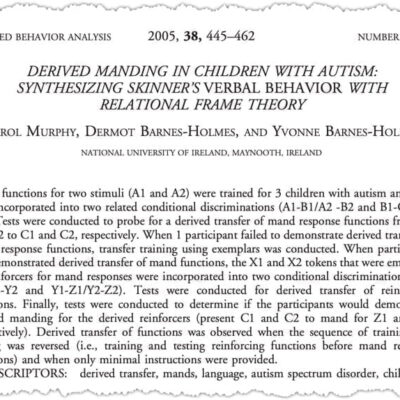The Generalization of Mands
Caio Miguel
The mand relation, a foundational verbal operant driven by a motivating operation (MO), enables individuals to make requests, directly benefiting the speaker and fostering other behavioral developments, including the reduction of problem behavior. This presentation from the 2019 Michigan Autism Conference explores how the mand’s occurrence, shaped by various discriminative stimuli (SDs), allows for its generalization across different MOs and SDs, and how the same MO can lead to new mand topographies.
This product has been discontinued.
You may also like…
-
Multimedia Tutorial

8 BCBA CEUs
An Introduction to Verbal Behavior
Norman Peterson4.24 out of 5(306)$79.99 Add to Cart Quick View -
Article Quiz

1 BCBA CEU
Derived Manding in Children with Autism: Synthesizing Skinner’s Verbal Behavior with Relational Frame Theory
Carol Murphy, Dermot Barnes-Holmes, & Yvonne Barnes-Holmes4.50 out of 5(16)$9.99 Add to Cart Quick View -
Multimedia Tutorial

7 BCBA CEUs
An Introduction to Relational Frame Theory (RFT)
Eric J. Fox4.55 out of 5(503)$69.99 Add to Cart Quick View

